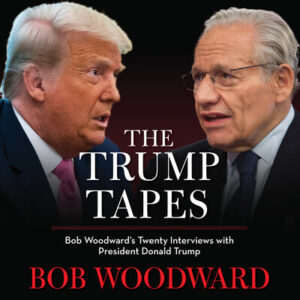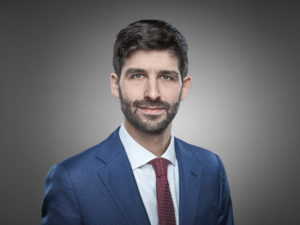The Copyright Battle Between Trump and Woodward: Who Owns the Interviews?
Somewhat lost among the many ongoing and significant cases involving Donald Trump, from his recent indictment stemming from hush money payments made to Stormy Daniels to E. Jean Carroll’s defamation and sexual assault suit, is an interesting copyright suit filed by Trump in the U.S. District Court in Florida earlier this year.
 The suit, against acclaimed journalist Bob Woodward and Simon & Schuster, Woodward’s publisher, concerns ownership of interviews Trump gave to Woodward that were later used in Woodward’s 2022 audiobook, The Trump Tapes: Bob Woodward’s Twenty Interviews with President Donald Trump. Trump claims that he owns the copyright to the interviews and gave Woodward a license of limited scope to use the interviews in Woodward’s 2020 book, Rage, but not in other works, and that he is owed upwards of $50,000,000 in damages as a result of the use of the interviews in The Trump Tapes.
The suit, against acclaimed journalist Bob Woodward and Simon & Schuster, Woodward’s publisher, concerns ownership of interviews Trump gave to Woodward that were later used in Woodward’s 2022 audiobook, The Trump Tapes: Bob Woodward’s Twenty Interviews with President Donald Trump. Trump claims that he owns the copyright to the interviews and gave Woodward a license of limited scope to use the interviews in Woodward’s 2020 book, Rage, but not in other works, and that he is owed upwards of $50,000,000 in damages as a result of the use of the interviews in The Trump Tapes.
Trump’s arguments are likely without merit. It is important to note at the outset that the question of whether an interview subject has claim to copyright of an interview recording is not entirely settled. In the Copyright Office’s Compendium of Practices, a non-binding manual, the Copyright Office assumes that interviewers and interviewees “own the copyright in their respective questions and responses” unless certain conditions are met. Courts, however, are not required to follow the guidance in the Compendium, and when the issue has been litigated, courts have found that interviewees do not own the copyright.[1] In such cases, courts have recognized that the interviewer (rather than the interviewee) is the primary author of an interview, that the interviewer is responsible for framing questions and making editing decisions for publication, and that copyright accordingly vests with them. Certainly, any other result might unduly restrict journalists’ freedom to conduct and publish interviews.
Trump’s complaint appears deficient on additional grounds.
First, a copyright infringement suit can only be instituted once the copyright has been registered with the Copyright Office.[2] Trump never registered (or even attempted to register) with the Copyright Office. The motion to dismiss filed by Woodward and Simon & Shuster’s attorneys makes just this point, noting that Trump’s failure to register “requires dismissal of his [c]opyright [c]laims as a matter of law.”[3]
Second, the fact that Trump was a sitting president at the time he sat for the interviews is problematic for his case. The Copyright Act does not make copyright protection available for “any work of the United States Government”[4], which includes works by any “officer or employee of the United States Government as part of that person’s official duties.”[5] It is clear that Trump was a government employee.
Trump’s participation in the interviews was also part of his “official duties”. As the motion to dismiss notes, “[c]ourts have consistently held that public officials act within the scope of employment when they discuss issues relevant to the performance of their duties in response to a reporter’s inquiries.”[6] That some of the interviews were conducted in the Oval Office should further bolster this argument, given that courts have found mere Tweets posted by elected officials to fall within the scope of their duties.
Trump is demanding a jury trial, but we likely won’t see one, given the major hurdles his faulty complaint will have to overcome to survive the motion to dismiss.
[1] See Taggart v. WMAQ Channel 5 Chi., No. CIV.A. 00-4205-GPM, 2000 WL 1923322 (S.D. Ill. Oct. 30, 2000).
[2] 17 U.S.C. § 411
[3] Memo. of Law in Support of Motion to Dismiss, Trump v. Woodward, No. 3:23-cv-02333-MCR-ZCB (Dist. Ct. Pensacola Div., N.D. Flor.).
[4] 17 U.S.C. § 105
[5] 17 U.S.C. § 101
[6] Memo. of Law in Support of Motion to Dismiss, Trump v. Woodward, No. 3:23-cv-02333-MCR-ZCB (Dist. Ct. Pensacola Div., N.D. Flor.) (internal citations and quotations omitted).
 This article is intended as a general discussion of these issues only and is not to be considered legal advice or relied upon. For more information, please contact RPJ Senior Associate Daniel Jason Ain who counsels clients in areas of entertainment, media and literary, intellectual property and employment law. Mr. Ain is admitted to practice law in the State of New York and the District of Columbia (admission pending).
This article is intended as a general discussion of these issues only and is not to be considered legal advice or relied upon. For more information, please contact RPJ Senior Associate Daniel Jason Ain who counsels clients in areas of entertainment, media and literary, intellectual property and employment law. Mr. Ain is admitted to practice law in the State of New York and the District of Columbia (admission pending).
